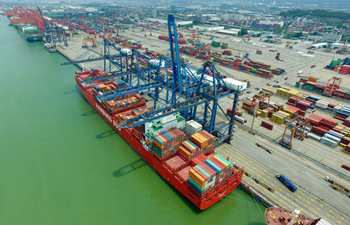ENTEBBE, Uganda, May 26 (Xinhua) -- Enactment of new policy and regulatory incentives coupled with better governance are key to stimulate growth of carbon trading in Africa, conservationists said on Friday.
The conservationists who attended a regional conference on sustainable forest management in Entebbe said that revival of the moribund carbon markets in Africa will spur economic growth while enhancing the continent's resilience to climate change.
Kevin Enongene, a Cameroonian environmentalist noted that carbon trading in Africa has potential for growth subject to political stability, regulatory reforms and capacity development.
"African countries should establish mechanisms to revitalize emissions trading in order to create new green jobs. Investments in large scale carbon trading projects will unleash more benefits to private firms and communities," Enongene said.
The international climate treaties oblige industrialized countries to invest in carbon offsetting projects in developing countries in Africa, Asia and Latin America that have borne the brunt of climate change.
Enongene said that volatility in the global carbon trading regime has negatively impacted on African countries' quest for low carbon development.
He urged governments across Sub-Saharan African region to address policy, institutional and technical hiccups that discourage investments in the Continents' carbon markets.
"The future of carbon markets in Africa will be promising if countries invest in technical capacity to implement projects while encouraging local private sector to be engaged fully in this arena," said Enongene.
Statistics from the UN indicate that Africa accounts for 2 percent of the global carbon market yet the continent is more vulnerable to negative impacts of uncontrolled green house gas emissions into the atmosphere.
Enongene noted that a drastic fall in the price of carbon from 20 U.S. dollars per ton in 2006 to 5 dollars per ton in the recent past has disrupted emissions trading regime in Africa.
"The price of carbon is very volatile nowadays and this is to blame for limited private sector investments in projects that would help African communities adapt better to climate change," Enongene remarked.
He proposed tax rebates, skills development alongside awareness targeting key stakeholders to revive carbon markets in Africa.
African countries should tap into green funds administered by multilateral agencies to implement grassroots led climate adaptation projects in the wake of volatility in carbon markets.
The Deputy Director of Kenya Forestry Research Institute (KEFRI), Joshua Cheboiwo, said carbon trade should be supplemented with ecosystems restoration projects to accelerate green growth in Africa.
"It is evident the international carbon trading regime is too bureaucratic and shrinking. African countries should therefore invest more in reforestation projects that can guarantee holistic climate resilience to communities," said Cheboiwo.

















